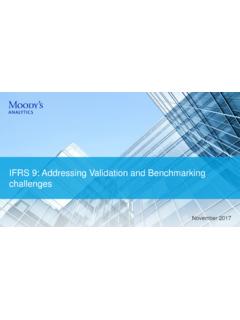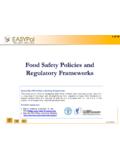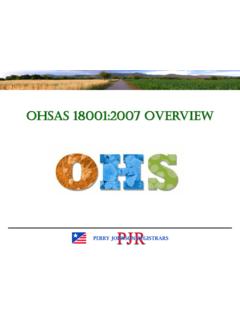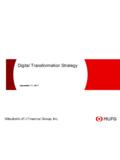Transcription of Shell Maritime Safety Conference
1 Maritime Safety Conference Summary Slides- 2016 Conference Series Care for People Cautionary Note The companies in which Royal Dutch Shell plc directly and indirectly owns investments are separate entities. In this presentation Shell , Shell group and Royal Dutch Shell are sometimes used for convenience where references are made to Royal Dutch Shell plc and its subsidiaries in general. Likewise, the words we , us and our are also used to refer to subsidiaries in general or to those who work for them. These expressions are also used where no useful purpose is served by identifying the particular company or companies. Subsidiaries , Shell subsidiaries and Shell companies as used in this presentation refer to companies in which Royal Dutch Shell either directly or indirectly has control, by having either a majority of the voting rights or the right to exercise a controlling influence.
2 The companies in which Shell has significant influence but not control are referred to as associated companies or associates and companies in which Shell has joint control are referred to as jointly controlled entities . In this presentation , associates and jointly controlled entities are also referred to as equity-accounted investments . The term Shell interest is used for convenience to indicate the direct and/or indirect ownership interest held by Shell in a venture, partnership or company, after exclusion of all third-party interest. This presentation contains forward-looking statements concerning the financial condition, results of operations and businesses of Royal Dutch Shell . All statements other than statements of historical fact are, or may be deemed to be, forward-looking statements.
3 Forward-looking statements are statements of future expectations that are based on management s current expectations and assumptions and involve known and unknown risks and uncertainties that could cause actual results, performance or events to differ materially from those expressed or implied in these statements. Forward-looking statements include, among other things, statements concerning the potential exposure of Royal Dutch Shell to market risks and statements expressing management s expectations, beliefs, estimates, forecasts, projections and assumptions. These forward-looking statements are identified by their use of terms and phrases such as anticipate , believe , could , estimate , expect , intend , may , plan , objectives , outlook , probably , project , will , seek , target , risks , goals , should and similar terms and phrases.
4 There are a number of factors that could affect the future operations of Royal Dutch Shell and could cause those results to differ materially from those expressed in the forward-looking statements included in this presentation , including (without limitation): (a) price fluctuations in crude oil and natural gas; (b) changes in demand for Shell s products; (c) currency fluctuations; (d) drilling and production results; (e) reserves estimates; (f) loss of market share and industry competition; (g) environmental and physical risks; (h) risks associated with the identification of suitable potential acquisition properties and targets, and successful negotiation and completion of such transactions; (i) the risk of doing business in developing countries and countries subject to international sanctions; (j) legislative, fiscal and regulatory developments including potential litigation and regulatory measures as a result of climate changes; (k) economic and financial market conditions in various countries and regions; (l) political risks, including the risks of expropriation and renegotiation of the terms of contracts with governmental entities, delays or advancements in the approval of projects and delays in the reimbursement for shared costs; and (m) changes in trading conditions.
5 All forward-looking statements contained in this presentation are expressly qualified in their entirety by the cautionary statements contained or referred to in this section. Readers should not place undue reliance on forward-looking statements. Additional factors that may affect future results are contained in Royal Dutch Shell s 20-F for the year ended 31 December, 2014 (available at and ). These factors also should be considered by the reader. Each forward-looking statement speaks only as of the date of this presentation 29 February, 2016. Neither Royal Dutch Shell nor any of its subsidiaries undertake any obligation to publicly update or revise any forward-looking statement as a result of new information, future events or other information.
6 In light of these risks, results could differ materially from those stated, implied or inferred from the forward-looking statements contained in this presentation . There can be no assurance that dividend payments will match or exceed those set out in this presentation in the future, or that they will be made at all. We use certain terms in this presentation , such as discovery potential, that the United States Securities and Exchange Commission (SEC) guidelines strictly prohibit us from including in filings with the SEC. Investors are urged to consider closely the disclosure in our Form 20-F, File No 1-32575, available on the SEC website You can also obtain this form from the SEC by calling 1-800-SEC-0330.
7 Agenda Day 1 Care for People What does Care for People Mean? Resilience Leads to Good Safety Experiencing Resilience Social Hour followed by Dinner @ 18:00 Day 2 Leadership, Learning and Behaviors Implementing the 3 Actions Measuring Success Improving our Focus on Learning and Behavior Shared Goal, Shared Focus Care for People Your What are the personal behaviors and/or values that contribute to good Safety performance? CARE FOR PEOPLE- RESILIENCE Five dead in explosion whilst tanker alongside DRILLING BARGE FIRE CLAIMS 21 LIVES Major Oil Transfer Facility Explosion Leaves Two Dead and One Critically Injured Oil Rig Spill One of Worlds Worst Environmental Disasters OIL PIPELINE SPILLS 21K GALLONS At least One dead after Tanker collides with Barge Maritime Industry Headlines SHARED GOAL Zero Incident Industry AGREED ACTIONS TO DATE Leadership Visits Reflective Learning Learning Engagement Tool Zero Incident Industry INTEGRATE WHAT S ALREADY DONE - RESILIENCE Leadership Visits Reflective Learning Learning Engagement Tool Zero Incident Industry Care for People - Resilience WHAT IS RESILIENCE?
8 ? RESILIENCE The ability to bounce back and learn from adversity THE RESILIENCE MODULES Keep Things in Perspective Change is Part of Living Take Decisive Action Take Care of Yourself What is Resilience? Modules have a practical and thought provoking element Modules are: For natural teams, or Experiential Peer Learning/Sharing Light and Easy Encouraged to change & personalise Paper based DRIVE RESILIENCE DRIVE ENGAGEMENT 45505560657001234 ENGAGEMENT vs MODULES Improving Engagement Score Number of Modules Completed 16 WHY CARE - ENGAGEMENT AND Safety ENGAGEMENT AND RATIO OF INCIDENTS PER EXPOSURE HOUR PROMOTE THE MODULES, IMPROVE RESILIENCE DRIVE ENGAGEMENT Safety AND PRODUCTIVITY AS AN OUTCOME 01234567 Improving Engagement Score Ratio of Incidents per Exposure Hour EXPERIENCING RESILIENCE Use this area for cover image (height , width 8cm)
9 Care for People Healthy High Performance Experiencing Resilience Why building Resilience is important Experiencing a Resilience module Resilience pilot in the Shell fleet Implementing Resilience The Resilience Modules Keep Things in Perspective Change is Part of Living Take Decisive Action Take Care of Yourself What is Resilience? Modules have a practical and thought provoking element Modules are: For natural teams, or Experiential Peer Learning/Sharing Light and Easy Encouraged to change & personalise Paper based Implementing Resilience: Care for People 1. Positive intent 2. Structured framework 3. No experts required 4. Flexible + Scalable 5. Global reach TAKE DECISIVE ACTION Implementing Resilience: Resilience Package ONE BOOKLET CONTAINS 2 PARTS: Facilitators Guide Participants Guide Implementing Resilience: The Resilience Modules Keep Things in Perspective Change is Part of Living Take Decisive Action Take Care of Yourself What is Resilience?
10 RESILIENCE = GREATER ENGAGEMENT = SAFER VESSELS 5 Modules Any order 1 per month Linked to behavioural Safety Relevant examples and context Qualitative Feedback From Shell Managed Vessels Shell Managed Vessels: Resilience Pilot Shell tested Resilience Modules in 2015 In association with Shell Health / Trinity College Dublin 20 vessels No train the trainer needed Enthusiastic facilitator is one of the crew Informal, small teams 30 minutes time max Adapted modules for use onboard We will be rolling it out across all 50 ships in 2016 Shell Managed Vessels: Resilience Experience Lively Discussions RESILIENCE = GREATER ENGAGEMENT = SAFER VESSELS Wonderful good to be appreciating one another Helps to highlight that stress is different for different people When you talk about it it s easier to move on Demonstrates Care for People Increases Socialisation Builds empowerment Builds Community A happy ship is a safe ship Implementing Resilience: Keys to Success What are the keys to success for rolling out the Resilience program on your vessels?





